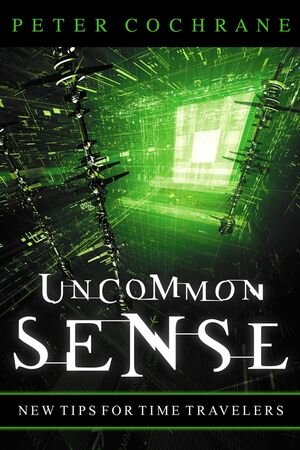
×
![Buchcover ISBN 9781841126104]()
„You will find it hard to put down...“ (Reading Chronicle, 29/7/04)
„A series of remarkable insights into work, communication, thefamily, communities and just about everything else touched bytechnology“ (The Times, 23rd September, 2004)
„You will find it hard to put down.“ (Institute of Directors, Autumn 2004)
„... a man with something to say to a world that should listen.“(City to Cities, November/ December 2004)
„... his ideas are provocative, his opinions refreshing and hisknowledge extensive... ideal for holiday reading...“ (Library & Information Update, July 05)
„... a series of challenging insights into work, communicationand the family... a must-read for anyone...“ (Long Range Planning, Number 38, 2005)
„Peter Cochrane is one of our most far-sighted visionaries, andbrings brilliant clarity and focus to our understanding ofourselves and our technologies, and of how profoundly each istransforming the other.“ -Douglas Adams, Author, The Hitch Hiker'sGuide to the Galaxy
In Uncommon Sense, Peter Cochrane's follow up to the radical 108Tips for Time Traveller, Peter explains how very simple analysisallows the prediction of such debacles as the 3G auction and thesubsequent collapse of an industry, whilst simple-minded thinkingis dangerous in the context of a world that is predominantlychaotic and out of control.
People balked when Peter suggested a wholesale move to eWorking, the rise of email and text messaging, and the dotcom regimemirroring the boom and bust cycle of the industrial revolution. Hispredictions of the use and growth of mobile devices andcommunication, or use of chip implants for humans to replace IDcards, passports, and medical records, or iris scanners andfingerprint readers - were all seen as unlikely. Today they are areality.
How then will the world react to his predictions as set out inUncommon Sense of a networked world of distributed ignorance andsharing overcoming an old world of concentrated skill and control? To everything becoming 'Napsterised' in every dimension, wherestorage and processing power cost nothing, and become connectedwithout the help of the old network companies? A world whereindividuals create their own networks, where laws of copyright andresale, and old business models have to be changed as giantindustries are dragged kicking and screaming out of the 19thCentury and into the 21st?
Peter Cochrane poses and answers questions, suggests solutions, and raises red flags on issues that need to be addressed. Tables, diagrams, pictures and illustrations generously support all of thetext, with the most difficult aspects illustrated by simulationsand other material on a CD and links to a web site with an ongoingexpansion of the themes addressed.
In Uncommon Sense, Peter Cochrane's follow up to the radical 108Tips for Time Traveller, Peter explains how very simple analysisallows the prediction of such debacles as the 3G auction and thesubsequent collapse of an industry, whilst simple-minded thinkingis dangerous in the context of a world that is predominantlychaotic and out of control.
People balked when Peter suggested a wholesale move to eWorking, the rise of email and text messaging, and the dotcom regimemirroring the boom and bust cycle of the industrial revolution. Hispredictions of the use and growth of mobile devices andcommunication, or use of chip implants for humans to replace IDcards, passports, and medical records, or iris scanners andfingerprint readers - were all seen as unlikely. Today they are areality.
How then will the world react to his predictions as set out inUncommon Sense of a networked world of distributed ignorance andsharing overcoming an old world of concentrated skill and control? To everything becoming 'Napsterised' in every dimension, wherestorage and processing power cost nothing, and become connectedwithout the help of the old network companies? A world whereindividuals create their own networks, where laws of copyright andresale, and old business models have to be changed as giantindustries are dragged kicking and screaming out of the 19thCentury and into the 21st?
Peter Cochrane poses and answers questions, suggests solutions, and raises red flags on issues that need to be addressed. Tables, diagrams, pictures and illustrations generously support all of thetext, with the most difficult aspects illustrated by simulationsand other material on a CD and links to a web site with an ongoingexpansion of the themes addressed.



